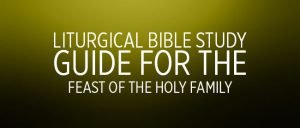Gospel
Background
The same as that of last Sunday.
Introduction
This Gospel passage is the continuation of last Sunday’s excerpt. Its central theme is brotherly love (see vv. 12 and 17) in imitation of the love Christ has shown for his disciples.
The passage emphasizes that the believers must be an integral part of the chain of love which unites the Father with Jesus, Jesus with his disciples, and the disciples among themselves.
Jesus said to his disciples:
“As the Father loves me, so I also love you.
Remain in my love.
If you keep my commandments, you will remain in my love,
just as I have kept my Father”s commandments
and remain in his love.”
“I have told you this so that my joy may be in you
and your joy might be complete.
This is my commandment: love one another as I love you.
No one has greater love than this,
to lay down one’s life for one’s friends.
You are my friends if you do what I command you.
I no longer call you slaves,
because a slave does not know what his master is doing.
I have called you friends,
because I have told you everything I have heard from my Father.
It was not you who chose me, but I who chose you
and appointed you to go and bear fruit that will remain,
so that whatever you ask the Father in my name he may give you.
This I command you: love one another.”
1st Reading
Historical Background
For centuries the Jews thought of themselves as the “Chosen People” and that their special position among all other peoples would last forever. But in God’s plan their “separation” from other peoples was only a temporary measure. The final objective was to unite all human beings into the new People of God through the preaching of the Gospel and the obedience of faith.
Introduction
Today’s episode – like the revelation that both Cornelius and Peter had (see Ats 10:1-23) – shows that it was God who took the initiative of bringing about the conversion of the Roman centurion. Peter was a docile instrument in starting the fulfillment of the divine plan to unite all nations into the new People of God.
When Peter entered, Cornelius met him
and, falling at his feet, paid him homage.
Peter, however, raised him up, saying,
“Get up. I myself am also a human being.”
Then Peter proceeded to speak and said,
“In truth, I see that God shows no partiality.
Rather, in every nation whoever fears him and acts uprightly
is acceptable to him.”
While Peter was still speaking these things,
the Holy Spirit fell upon all who were listening to the word.
The circumcised believers who had accompanied Peter
were astounded that the gift of the Holy Spirit
should have been poured out on the Gentiles also,
for they could hear them speaking in tongues and glorifying God.
Then Peter responded,
“Can anyone withhold the water for baptizing these people,
who have received the Holy Spirit even as we have?”
He ordered them to be baptized in the name of Jesus Christ.
2nd Reading
Historical Background
The same as that of the Second Reading of the Second Sunday of Easter.
Introduction
Today’s passage belongs to the third part of John’s letter (4:7-5:3), and could be entitled “the sources of our love and faith.” These few verses pinpoint:
a. the essential relationship between God and love (vv. 7-8), and
b. the role of Jesus Christ in revealing God’s saving love (vv. 9-10).
Beloved, let us love one another,
because love is of God;
everyone who loves is begotten by God and knows God.
Whoever is without love does not know God, for God is love.
In this way the love of God was revealed to us:
God sent his only Son into the world
so that we might have life through him.
In this is love:
not that we have loved God, but that he loved us
and sent his Son as expiation for our sins.




